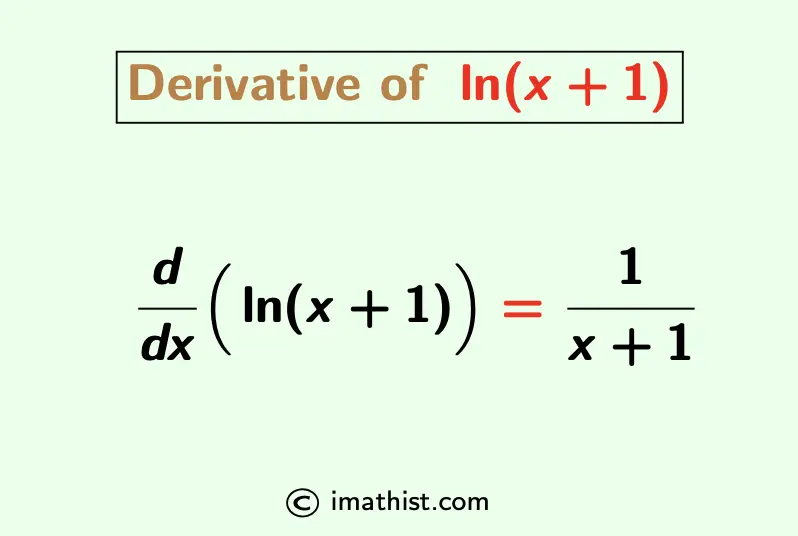The derivative of ln(x+1) is equal to 1/(x+1). Ln(x+1) denotes the natural logarithm of x+1, that is, ln(x+1) = loge(x+1). Here we will find the derivative of ln(x+1) using the following methods:
- Chain rule
- First principle.

The derivative of ln(x+1) is denoted by d/dx {ln(x+1)} and its formula is given by
$\dfrac{d}{dx} \Big(\ln (x+1) \Big)=\dfrac{1}{x+1}.$
Derivative of ln(x+1) by Chain Rule
Let z=x+1.
So $\dfrac{dz}{dx}$ = 1.
Now by the chain rule of differentiation, the derivative of ln(x+1) will be
$\dfrac{d}{dx} \Big(\ln (x+1) \Big)$ = $\dfrac{d}{dz} \big(\ln z \big) \times \dfrac{dz}{dx}$
= $\dfrac{1}{z} \times 1$ as the derivative of lnx is 1/x.
= $\dfrac{1}{x+1}$ as z=x+1.
So the derivative of ln(x+1) is equal to 1/(x+1), and it is obtained by the chain rule of differentiation.
More Derivatives:
Derivative of ln(x+1) by First Principle
By first principle, $f'(x)$ = limh→0 $\dfrac{f(x+h)-f(x)}{h}$.
Put f(x)= ln(x+1).
So $\dfrac{d}{dx} \Big(\ln (x+1) \Big)$ = limh→0 $\dfrac{\ln(x+1+h)-\ln (x+1)}{h}$
= limh→0 $\dfrac{\ln \Big(\dfrac{x+1+h}{x+1} \Big)}{h}$
= limh→0 $\dfrac{\ln \Big(1+\dfrac{h}{x+1} \Big)}{h}$
| Let $\dfrac{h}{x+1}$ = z, so that z→0 when h→0. Also, h=z(x+1). |
= limz→0 $\dfrac{\ln \big(1+z \big)}{z(x+1)}$
= $\dfrac{1}{x+1}$ limz→0 $\dfrac{\ln \big(1+z \big)}{z}$
= $\dfrac{1}{x+1} \times 1$, as the limit of ln(1+x)/x is 1 when x→0.
= $\dfrac{1}{x+1}$.
So the derivative of ln(x+1) by the first principle is equal to 1/(x+1).
You Can Read: Derivative of lnu | Log u Derivative
FAQs
Q1: What is the derivative of ln(x+1)?
Answer: The derivative of ln(x+1) is 1/(x+1).
Q2: If y=ln(x+1), then find dy/dx.
Answer: If y=ln(x+1), then dy/dx = 1/(x+1).